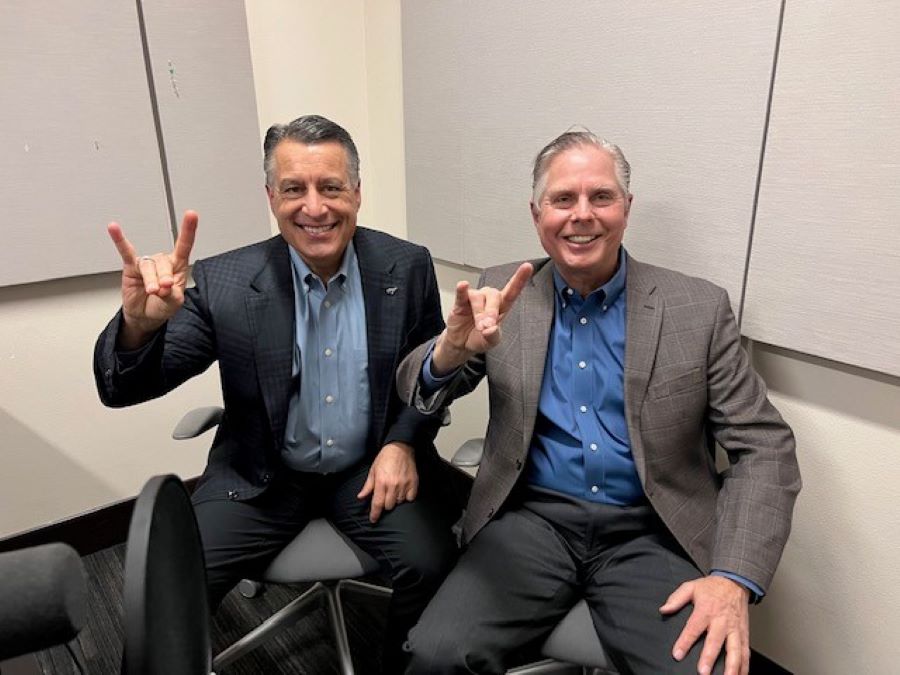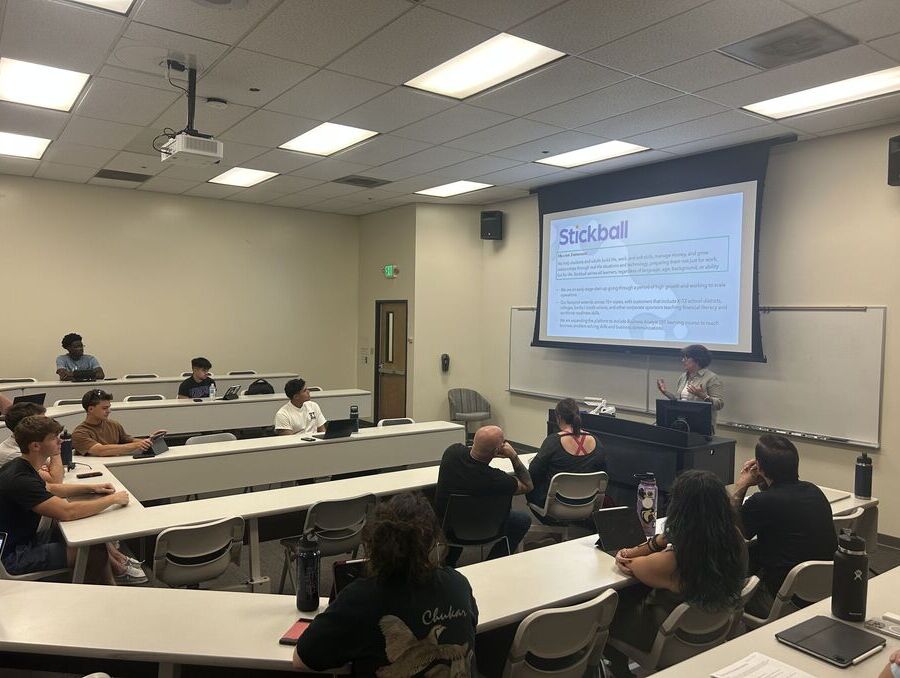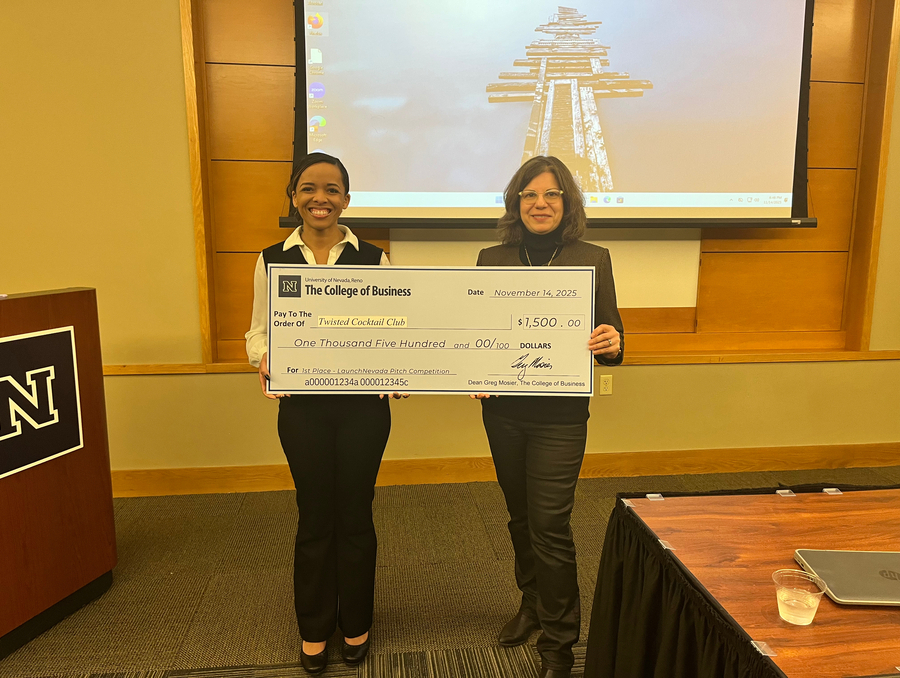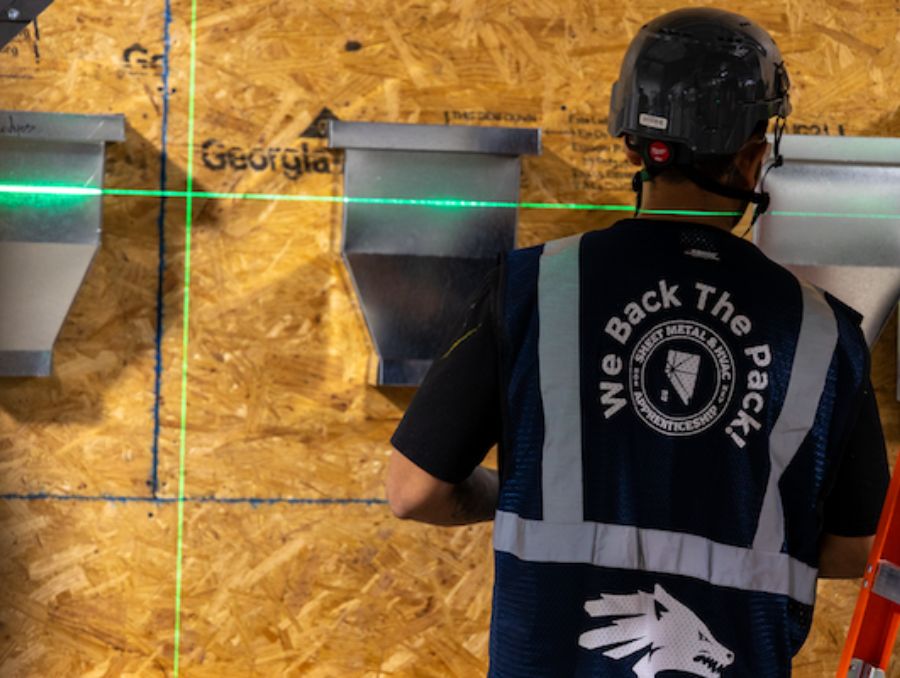
University of Nevada, Reno President Brian Sandoval kicks off a new season of Sagebrushers with College of Business Dean Gregory Mosier, currently the longest-standing dean on the university campus.
Mosier, dean of the College of Business since 2007, provides executive support for about 75 faculty, 35 professionals and 3,500 students at the bachelor, master and doctoral levels. Prior to his academic career he was a corporate attorney in the oil and gas industry who was licensed to practice law in Kansas, Texas and Oklahoma.
During the episode, Sandoval and Mosier discuss the growing enrollment of the College of Business, the future of business education and the essential technical and soft skills needed to excel in the business sector. They also delve into the new College of Business building being constructed at the south end of campus. The five-story, 128,000 square foot facility will feature dynamic environments for students fostering collaborative technology, deeper interactions with the region’s business leaders and equipping students to thrive in the global business arena.
Sagebrushers is available on Spotify, Apple Podcasts and other major podcast platforms, with new episodes every month.
Sagebrushers – S3 Ep. 1 – College of Business Dean Gregory Mosier
Join host President Brian Sandoval as he and College of Business Dean Greg Mosier discuss the future for business students and programs as collaborative technology is enhanced, business partnerships improve and the state-of-the-art facility is built on the south end of campus.
Dean Gregory Mosier: I actually talked to the faculty and remind them that when we show up for classes on the first day of the fall, that there will be 3,500 students here who are convinced as we've told them that we can help make their lives better.
President Brian Sandoval: This is Sagebrushers, the podcast of the University of Nevada, Reno. Here on Sagebrushers, which, by the way, was our University's first nickname, we take a closer look at the people, history and future of our University.
Welcome back Wolf Pack family to season three of Sagebrushers. I'm your host, University President Brian Sandoval. From accounting to AI, supply chains and everything in between, business is constantly evolving and the technical and soft skills students need to work in these sectors are constantly changing too. Today's guest has been part of this evolution for the past 17 years on campus. Dr. Greg Mosier, Dean of the College of Business, joins me now to explore how the college is preparing students for careers after graduation, some exciting updates regarding the new College of Business Building and his unique ties to the state of Nevada and more. Let's get started.
In his current role, Dean Mosier provides executive support for approximately 75 faculty, 35 professionals and 3,500 students at the Bachelor, Master, MBA and Ph.D. levels. He also serves on the International Advisory Board for the SGH Warsaw School of Economics, and is a frequent contributor to global business school accreditation activities of the association to advance collegiate schools of business. Previously at Oklahoma State University, Dean Mosier was interim Dean of Business, associate dean, regent service professor, and an endowed professor. He's a former corporate attorney working in the oil and gas industry and passed the state bar exams of Kansas, Texas and Oklahoma. Dean Mosier earned a B.S. in Education from Oklahoma State University, a JD from the University of Kansas, and an Ed.D. from Oklahoma State University. Today’s podcast is being recorded at the Reynolds School of Journalism on our university’s campus. Dean Mosier, welcome to Sagebrushers. I'm excited to hear about your history on campus and to learn about the future of business education.
Dean Mosier: Well, thank you very much, President Sandoval, and it really is great to be here. I wanted to just start off talking to you a little bit about a little bit of my background that led me into education, and I think a lot like you, I'm really a fan of history. I think that informs us so much about how things are the way they are and directions that we’re going. So, if I look at my family history that led me into education, I would say that was kind of the family calling, if you will, is to move into education. My father was a president of a community college while I was growing up. I have a sister who was a president of a community college, uncles and cousins who all worked in higher education in different roles through my life. And I think that all goes back a little bit to, I had a grandfather who, my grandmother and grandfather had 11 children and all of their kids were first generation college students who mostly went to Kansas State University. They were land grant kids. My grandmother would always joke is that they were trying to find any way they could to get off the farm, but they saw education as a way to really improve the quality of life of people. I think that permeated down to my generation of the whole family as well. So all of my background really comes from that, being informed by a family calling that the great things education can do.
President Sandoval: So, did you grow up on the farm as well?
Mosier: I actually did, and mostly it was I would go back to my grandparents every summer, 12 summers and we would move irrigation pipe, we would work cattle, we'd fix fences, we'd put up hay. And of course what that does teach you is you want to get an education because that's a rough row to hoe doing that.
President Sandoval: You mentioned you’re a recovering lawyer, I mentioned that. So why the shift? It sounds like you're having an amazing legal career and then you moved on into education.
Mosier: Yeah, I mean I always wanted to move into education and it was one of those decisions I made very early on. My undergraduate degree is in secondary education and I had a great experience student teaching fourth graders science, which was really a great experience. And what that led me to is to really appreciate what public school teachers do and go through. It's amazing the transformation they can have in students' lives. And then it's also amazing the constraints that K through 12 has that they have to deal with. And so quite frankly, since my family had the background in higher ed and because I'm looking at that, I'm thinking, okay, I want to make a contribution at a different level than that, even though my degree was in that. And so I made the decision to go to law school as kind of like a curve ball, if you will.
The normal path would be as you get a bachelor's and then you go get a master's and then you get the PhD. And even when I went to law school, had the intention of trying to work in higher ed, again, it was a little bit of a curve ball, but I wanted to have a more unique, innovative approach to what we were going to do in higher ed. And so even when I went to the law firm and worked in the oil and gas company, it was in the back of my mind, this is not going to be forever. This is going to be, I'm going to learn a skillset. I'm going to work in an industry and pick up a lot of different things, but I want to get back into colleges and universities.
President Sandoval: So you had an incredibly impressive career at Oklahoma State. You can talk a little bit about that and then what brought you to Reno?
Mosier: Yeah, well, it's kind of interesting, this search firm that actually called me about this position here because I had had these different experiences at Oklahoma State and it was all going along pretty well and I enjoyed all of those things. And the search firm always says their job is to disrupt people's lives. And it's true. I mean because if we don't know about what opportunities are around the state, around the country, around the world, if we don't take a look at that broader aspect of how you can make a difference, then you sometimes will get stuck in a position and you'll say, I'm just going to play this thing out. And the search term made it very clear is that they like to throw those opportunities out in front of people and say, you may have never thought of this. And that was kind of it. I had never thought about it. And you look at it and you think, I think I could make a difference. It's something different than what I'm currently doing. I'm not sure I want to just coast out doing the same things I'm currently doing. And so it's kind of like grabbing the brass ring a little bit that you decide to do. And so that's kind of what brought me here.
President Sandoval: And now as we get to the present, you are the longest tenured dean on the campus at the University of Nevada Reno. So can you share a little bit about that experience since 2007?
Mosier: Yeah, it's kind of fascinating. Nobody really enters into these things necessarily thinking I'm going to be doing that this long. The thing that I have found is that the opportunity for growth and change has never been stymied. It's almost every single year there's more opportunity to grow, to do innovative things, to contribute to the community, to build the brand, if you will, of both the college and of the university. And so it's a thing that always keeps me motivated. I don't ever feel stuck. I know some people in careers feel stuck. I've never felt stuck. And you can just even look at it as way things currently stand. I know we're going to talk in a little bit about the new business building. I mean that's a major thing, but it's programs as well that we've been able to develop. I think University of Nevada has just provided such a great environment to be able to grow and do the things that I feel strongly about that here I am. And it's 2024 and came here in 07 and enjoying every minute of it.
President Sandoval: So let's talk a little bit about, you've had an explosive amount of growth and then the changes and as you talked about how business evolves and what we can do now and what you're teaching now versus what we were teaching back in 2007.
Mosier: Yeah, pedagogy and business has changed a lot. When I first started in business education and most of higher education, everything was focused upon kind of an old, I'll tell you, post World War II model of a rectangular classroom with seats that all face the front and there's a board and there's a professor with their back to the students writing on that board. And almost all education has evolved out of that into a much more collaborative expectation. And it's collaborative using technology. It's collaborative in terms of more conversational that takes place, both between the students themselves and the faculty members and the students. I've seen that really evolving. There's all kinds of things that kind of represent that. I mean, it includes our outreach on our international business programs. It's conversations not just with people here in Reno, but people around the world. What does this look like in terms of educating in places like Warsaw and what does that mean to them?
And knowing that that's what our students, that's where they're competing is in a global business environment. And so they need to really understand those things. That's been a major shift about how higher education was, because in the old days, it was much more of a, I'm going to teach you how to do debits and credits, and that would be where it'd be cut off. But here at Nevada, the program growth has been amazing along with enrollment growth. We did not have any PhD programs in business when I first started. We now have one in economics and then emphasis areas and a PhD in business in management and finance and information systems that we're offering. We didn't have any online programs. And we currently have nationally recognized executive MBA program that's online. And then we have some other online programs and master of accountancy and also in business analytics. And so it's just this opportunity for growth again that we've seen and the shifting of how things take place.
President Sandoval: So one thing you mentioned, the students and Northern Nevada has changed dramatically in the last 10 years with these companies coming. And there are a lot of prospective businesses, and I get asked the question, and I'm sure you get asked the question, what are your graduates out of the college of business? How are they prepared? What can they do? Why should I hire them?
Mosier: Yeah, you start with one of the things you do in college education is you do want to provide a skillset. I actually talk to the faculty and remind them that when we show up for classes on the first day of the fall, that there will be 3,500 students here who are convinced, as we've told them, that we can help make their lives better because there's no other reason that they're here. I mean, that's really why people go into higher ed is because we are able to tell them, we can make your lives better if you come and get this skillset. And so we do focus a lot upon the necessary skill sets in all of our academic disciplines. And we have a lot of 'em, of course, in business, which all of course inform the business enterprise. So accounting and marketing and management and finance, economics, information systems, all those things are so critical in every business.
It could be a sole proprietorship, it could be a major Fortune 100 company, but a person who goes to work in those needs to have a background in each of those areas. So we do a really good job, but with our instructors who we hire from around the world and around the country to come in here, they're the best in terms of doing that. But then moving beyond that, the thing that really is essential is soft skills. And that really is the difference maker because you can have some people who are really smart and know the Ps and Qs about what they're going to be doing and the skillset, but the soft skills about how they interact with other people, how they're able to network, that's so critical. And one thing I'll tell you about the new building that we're building, that's really a thing that's focused on, and it's around those soft skills about students learning how to work, not just with their fellow students, but with members of the business community, people that we bring in who are working professionals. It's going to be the difference maker for us.
President Sandoval: So you've mentioned the business building, new business building twice and sorry, business building. Love it. I was here when it was first built in 1984. It's served a great purpose. So why the impetus to build a new business building? And there may be some people out there, what do you need A new business building for isn't the one we have just fine?
Mosier: Well, I'm glad you bring that up. And it's always a very complex answer to these kinds of things. One of the things that we're really up against is we have no space that's in the current business building that we're in, the amount of space that's allocated to the business college in that building isn't sufficient to run the programs we need to run for our current student enrollment. Currently, we are the largest academic unit college on campus with regard to number of graduates each year. We graduate more students each year than any other college. And that growth that we've seen has really put stresses upon how we teach in this 21st century pedagogy model. So if you take the things around the need to teach the skillsets along with the networking, along with the collaboration, we just needed new space because the current building was configured for something back in the 1980s, and it's still a really good usable space for some disciplines. And I know the university with its growth needs that space as well. It's just not the right kind of space for business education in the 21st century.
President Sandoval: No, and I agree. For me, I think you know this, I'm an econ minor and the technology and as you say, the pedagogy has changed so dramatically. So talk real quickly about what's this building going to look like? What's going to be in it?
Mosier: Yeah, it's going to be really a gateway, if you will, which is of course what we're calling that part of the campus down there. The gateway to the university, and it is intended to be a gateway to the university. We want it to be at a place that's welcoming to members of the community, members of the professions, business leaders. We want them to be able to come in and participate with us in this learning exercise about how we do things in terms of just scope and scale, it's going up as we speak. And it'll be five stories tall. There's about 128,000 square feet, which sounds like a lot. But the other thing we get into is almost everything else in a capitalistic free market society, like what we live in, there's competition in this space. And so we've took a really deep dive in looking at surrounding universities that are peers, and this is what we need to be able to be competitive with places like Oregon State University or Boise State, which has a pretty new building and Utah state, which has a pretty new building. And so we're constantly surveying the landscape in this competitive mode. And the reason we do that, of course, is because we have an industry base here that we need to serve. And we're only going to serve it if we have sufficient students graduating that want to go to work in those companies. And that's again, a thing that drives our enrollment initiatives is that we need to be bigger and we need to be educating more students because Northern Nevada economy needs those students.
Sandoval: For the listeners really invite you. If you haven't been to campus on the corner of ninth and Virginia facing downtown, it's right there going up and it's going to be spectacular. So we are almost out of time. So one lightning-round question. What is your favorite part of living in Northern Nevada?
Mosier: Well, I'm going to tell you a history answer again on all that. So of course, the place is beautiful, right? I mean, the whole state is beautiful, the people are outstanding that are here. But I have a family background here, and my great grandmother was born in Austin, Nevada. And her dad, he and his sisters all moved out here back in the 19th century and lived in places as diverse as Esmeralda County up into Carson City and over into Yerington. And so that kind of historical tie to a place that offered them so much opportunity and the people and the things that were here then are the things that I really appreciate about Nevada as well.
Sandoval: Well, those are some true Nevada roots. Well, unfortunately, that is all the time we have for this episode of Sagebrushers. Thank you again for being with us today, Dean Mosier. And ladies and gentlemen, join us next time for another episode of Sagebrushers as we continue to tell the stories that make our university special and unique. Until then, I'm University President Brian Sandoval and Go Pack.
















